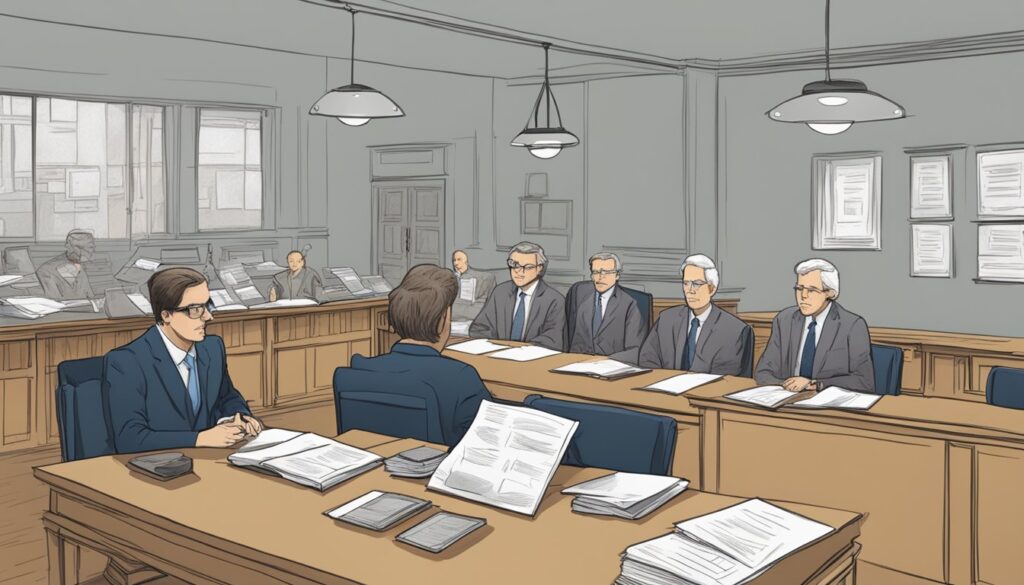200+ Interview Questions for Judges: Key Inquiries for Assessing Legal Expertise

Selecting judges is a critical process for the integrity of the legal system and society at large. The path to becoming a judge typically begins with an extensive education, often including law school, followed by years of legal practice.
But beyond these prerequisites, understanding a candidate’s qualifications, judicial philosophy, and potential impact on the judiciary requires a thorough and specific line of questioning.
The interview process for judges is thus a meticulous and complex undertaking, aiming to evaluate the candidate’s competency and suitability for a judicial role.

Interview questions for judges are crafted to probe deep into the candidates’ legal knowledge, ethical compass, and decision-making processes.
They are designed to reveal not only the intellectual acumen of the applicants but also their temperament, impartiality, and ability to balance the letter of the law with the fluctuating dynamics of society. This careful vetting process is essential in ensuring that those who ascend to the bench are equipped to handle the weighty responsibilities that come with interpreting and applying the law.

The societal expectation is that judges will administer justice fairly and without bias, making their selection a matter of public interest.
As such, the questions posed to judicial candidates are reflective of the values and legal sophistication that society holds dear.
The interview is an opportunity to assess how prospective judges might influence the legal landscape and affect the daily lives of citizens, shaping society’s trajectory through their rulings and judicial philosophy.
Sample Interview Questions for Judges

When interviewing applicants for a judicial position, questions should not only assess the candidate’s legal knowledge but also their decision-making skills, commitment to fairness, and analytical abilities.
Below are sample questions with an overview of the kind of answers an interview panel might expect from a well-qualified judge candidate.
- Can you describe a particularly complex legal issue you have worked on?
Ideal responses should demonstrate the candidate’s analytical skills and attention to detail. - How do you ensure impartiality when making decisions?
They should highlight awareness of personal biases, commitment to the law, and respect for legal precedent. - Discuss an instance where you disagreed with a legal precedent. How did you handle it?
Responses should reflect respect for the court hierarchy and decision-making within the bounds of the law. - What role do personal beliefs play in your judicial decision-making?
Expect answers that emphasize the subordination of personal beliefs to the rule of law and court responsibilities. - How do you handle feedback regarding your decisions?
Look for evidence of a commitment to self-improvement and openness to constructive criticism. - Provide an example of your legal writing and its impact.
Candidates should discuss how their writing skills influenced a legal decision or clarified a complex legal matter. - How do you keep up-to-date with changes in laws and legal precedent?
Judges should mention continued education, reading current legal publications, and utilizing databases. - Have you ever identified a potential conflict of interest in your work, and how did you deal with it?
Answers should demonstrate proactive measures in maintaining fairness and integrity. - What is your approach when faced with a novel legal issue?
Judges are expected to exhibit critical thinking and diligent research capabilities. - In what ways have you demonstrated a commitment to diversity and inclusion within the legal system?
Responses might include involvement in community outreach, mentorship programs, or policy development. - How do you manage courthouse decorum and etiquette?
A judge should articulate a clear understanding of appropriate courtroom conduct and communication techniques. - What strategies do you use to deal with high-pressure situations in the courtroom?
Expect answers involving calm demeanor, sound judgment, and clear communications under stress. - Illustrate how you would handle a mistake you made in a legal decision.
Look for an acceptance of responsibility and a preparedness to correct errors in judgment. - Describe your experience in constitutional law and how it influences your judicial philosophy.
An answer should detail their legal experience and understanding of constitutional principles. - If chosen for this role, what are your strategies for effective decision-making?
Applicants should discuss methods that showcase an organized thought process and fairness in judgment.
List of 200 Questions for Judiciary Exams
- Can you discuss any specific coursework or legal projects from your academic experience that are particularly relevant to your legal practice?
- How do you feel your legal education has prepared you for your current role?
- Can you walk me through any academic achievements or honors you received during your legal education?
- Can you discuss any legal research or thesis projects you completed during your academic studies?
- How did you approach time management and prioritization of tasks during your legal education?
- Can you provide an overview of your educational background?
- What motivated you to pursue your chosen field of study?
- Can you discuss any relevant coursework or projects from your academic experience?
- How do you feel your education has prepared you for this position?
- What role did legal conferences or symposiums play in your legal academic development, and how do you see participation in such events contributing to your role in judicial services?
- How did you approach building and presenting your legal work in public forums or conferences, and how do you anticipate this experience being relevant to the responsibilities of a judge?
- Can you discuss any experiences where you contributed to legal research or innovation within your field of study, and how you believe these contributions have prepared you for a career in the judiciary?
- What role did legal publications or presentations play in your legal academic journey, and how do you see these experiences being relevant to your role in judicial services?
- Can you provide examples of how you have engaged with legal ethics and professional conduct during your legal education, and how you plan to apply these principles in the context of judicial services?
- How did you approach building and maintaining a strong understanding of legal precedents and case law during your legal education, and how do you plan to utilize this knowledge in the judiciary?
- Can you discuss any experiences where you have actively sought to understand and apply principles of justice and fairness, and how you intend to uphold these principles in a judicial role?
- What role did courtroom observation and practical legal experiences play in your legal education, and how do you believe these experiences have prepared you for the responsibilities of a judge in the judiciary?
- Can you walk me through your work history, starting with your first job?
- Can you discuss any significant achievements or challenges from your previous jobs?
- How have your previous roles shaped your professional skills and expertise?
- Have you encountered any obstacles or setbacks in your career, and how did you overcome them?
- How do you stay informed about developments in your field outside of the workplace?
- Can you provide examples of how you have continued to learn and grow professionally?
- What are your long-term career goals, and how do you plan to achieve them?
- How do you prioritize continuing education and professional development in your career?
- How do you stay current with industry trends and best practices?
- Can you describe any professional affiliations or memberships that have impacted your career?
- What role has mentorship played in your career development?
- Can you discuss any significant personal or professional challenges that have shaped your career?
- Can you provide examples of how you have demonstrated leadership in your career?
- What motivates you to excel in your professional endeavors?
- Can you discuss any experiences working in a team environment and your contributions to the team’s success?
- How do you handle conflicts or disagreements in the workplace?
- Can you discuss any experiences working with individuals from diverse backgrounds or cultures?
- How do you approach building and maintaining professional relationships?
- Can you discuss any experiences working with cross-functional teams and the outcomes of those collaborations?
- How do you approach building consensus and driving alignment within a team or organization?
- Can you provide examples of how you have contributed to fostering a positive work culture?
- How do you handle stress and pressure in the workplace, and can you provide examples of how you have managed challenging situations?
- How do you approach time management and prioritize tasks in your professional life?
- Can you discuss any experiences where you have had to manage competing priorities and deadlines?
- Can you provide examples of how you have utilized technology to streamline processes or improve efficiency in your work?
- How do you approach problem-solving and decision-making in your professional role?
- Can you discuss any experiences where you have had to make difficult decisions and the outcomes of those decisions?
- What role does creativity and innovation play in your professional approach, and can you provide examples of how you have contributed to innovative solutions?
- How do you approach risk-taking and uncertainty in your professional endeavors?
- What role does ethics and integrity play in your professional conduct, and can you provide examples of how you have demonstrated ethical behavior in the workplace?
- How do you approach conflict resolution and negotiation in professional settings?
- Can you provide examples of how you have effectively mediated conflicts or negotiated successful outcomes?
- How do you approach professional development and mentorship opportunities for others in your field?
- Can you discuss any experiences where you have mentored or coached others to support their professional growth?
- How do you approach communication and collaboration across different levels of an organization?
- What role does strategic thinking and long-term planning play in your professional approach?
- How do you approach learning from failure and turning setbacks into opportunities for growth?
- What role does adaptability and flexibility play in your professional approach, and can you discuss any experiences where you have had to adapt to changing circumstances?
- How do you approach personal and professional goal-setting, and can you discuss any experiences of setting and achieving significant goals?
- Can you provide examples of how you have demonstrated resilience and perseverance in your professional endeavors?
- Can you discuss any experiences where you have received constructive feedback and used it to enhance your performance?
- What role does self-motivation and initiative play in your professional success?
- Can you provide an overview of your educational background?
- What motivated you to pursue your chosen field of study?
- Can you discuss any specific coursework or projects from your academic experience that are particularly relevant to the role you are applying for?
- How do you feel your education has prepared you for this position?
- Can you walk me through your academic achievements and any honors or awards you received during your education?
- Can you discuss any research or thesis projects you completed during your academic studies?
- How did you approach time management and prioritization of tasks during your education?
- Can you provide examples of how you collaborated with peers or professors on academic projects or initiatives?
- How did you approach problem-solving and critical thinking in your academic coursework?
- Can you discuss any experiences where you had to adapt to changes in the academic environment or curriculum?
- What role did extracurricular activities or volunteer work play in your overall educational experience?
- Can you provide examples of how you applied your academic knowledge in real-world or practical settings, such as internships or projects?
- How did you approach building and maintaining relationships with professors, mentors, and peers during your education?
- Can you discuss any experiences of overcoming academic challenges or setbacks and how you managed them?
- How did you approach time management and balancing academic commitments with personal responsibilities during your education?
- How did you approach seeking out and taking advantage of professional development opportunities during your education?
- Can you discuss any experiences where you actively sought out mentorship or guidance from professors or academic advisors?
- What role did self-motivation and initiative play in your academic success?
- How did you approach building resilience and coping with academic pressure and stress?
- What role did community involvement and social responsibility play in your academic pursuits?
- How did you approach building cross-cultural communication skills and understanding in your academic interactions?
- What role did mentorship and coaching play in your academic development?
- Can you provide examples of how mentorship or coaching positively impacted your academic journey?
- How did you approach building and leveraging your academic network for learning and growth opportunities?
- What role did continuous learning and skill development play in your academic advancement?
- What role did diversity and inclusion play in your legal academic interactions and experiences?
- How did you approach time management and balancing academic commitments with personal responsibilities during your legal education?
- Can you provide examples of how you leveraged technology and digital resources to enhance your legal academic performance?
- How did you approach seeking out and taking advantage of professional development opportunities during your legal education?
- Can you provide an overview of your experience and background as an advocate?
- What motivated you to pursue a career as an advocate?
- Can you discuss any specific cases or legal projects from your advocacy experience that are particularly significant to your career?
- How do you feel your advocacy experience has prepared you for your current role?
- Can you provide an overview of your educational background and legal training in preparation for judicial services?
- What motivated you to pursue a career in the judiciary and aspire for judicial services?
- Can you discuss any specific legal coursework or projects from your academic experience that are particularly relevant to the role of a judge?
- How do you feel your legal education has prepared you for the responsibilities of a judicial role?
- What role did continuous learning and skill development play in your legal academic advancement, and how do you plan to continue this approach in your pursuit of judicial services?
- Can you discuss any experiences where you applied your legal knowledge in real-world settings through internships, legal projects, or practical experiences, and how these experiences have prepared you for a career in the judiciary?
- How did you approach seeking out and taking advantage of professional development opportunities during your legal education, and how do you plan to continue this pursuit in the context of judicial services?
- Can you provide examples of how you utilized legal resources to support your educational goals and achievements, and how you foresee leveraging similar resources in the judiciary?
- Can you provide examples of how you have engaged with legal principles related to human rights and social justice, and how you plan to uphold these principles in the judiciary?
- How did you approach building and maintaining professional integrity and ethical conduct during your legal education, and how do you plan to exhibit these qualities in a judicial services role?
- Can you discuss any experiences where you have worked to promote access to justice and legal representation, and how you plan to continue this work in the context of judicial services?
- Can you provide examples of how you have engaged with legal principles related to constitutional law and governance, and how you plan to apply this knowledge in a judicial role?
- How did you approach seeking out and understanding the principles of legal ethics and professional responsibility during your legal education, and how do you plan to uphold these principles as a judicial services aspirant?
- Can you discuss any experiences where you have demonstrated a commitment to upholding the independence and integrity of the judiciary, and how you intend to continue this commitment in your pursuit of judicial services?
- What role did legal research and analysis play in your legal academic journey, and how do you plan to apply these skills in the context of judicial services?
- How did you approach seeking out and understanding the principles of legal accountability and transparency during your legal education, and how do you plan to embody these principles in a judicial role?
- Can you provide examples of how you have engaged with legal principles related to administrative law and regulatory matters, and how you plan to apply this knowledge in a judicial role?
- Can you discuss any experiences where you have engaged with legal principles related to environmental law, and how you plan to apply this knowledge in the context of judicial services?
- How did you approach seeking out and understanding the principles of legal dispute resolution and conflict management during your legal education, and how do you plan to utilize these principles in a judicial role?
- Can you provide examples of how you have engaged with legal principles related to family law and domestic relations, and how you plan to apply this knowledge in the context of judicial services?
- What role did legal principles related to property and real estate play in your legal academic pursuits, and how do you plan to apply this knowledge in a judicial role?
- How did you approach seeking out and understanding the principles of legal principles related to intellectual property and innovation during your legal education, and how do you plan to apply this knowledge in the context of judicial services?
- Can you discuss any experiences where you have engaged with legal principles related to commercial law and business transactions, and how you plan to apply this knowledge in the context of judicial services?
- How did you approach seeking out and understanding the principles of legal principles related to labor and employment law during your legal education, and how do you plan to apply this knowledge in a judicial role?
- Can you provide examples of how you have engaged with legal principles related to criminal law and justice, and how you plan to apply this knowledge in the context of judicial services?
- What role did legal principles related to international law and global relations play in your legal academic pursuits, and how do you plan to apply this knowledge in a judicial role?
- How did you approach seeking out and understanding the principles of legal principles related to human rights and humanitarian law during your legal education, and how do you plan to apply this knowledge in the context of judicial services?
- Can you discuss any experiences where you have engaged with legal principles related to immigration law and refugee rights, and how you plan to apply this knowledge in the context of judicial services?
- What role did legal principles related to public interest litigation and social justice play in your legal academic pursuits, and how do you plan to apply this knowledge in a judicial role?
- Can you provide examples of how you have engaged with legal principles related to administrative law and regulatory matters, and how you plan to apply this knowledge in the context of judicial services?
- How did you approach seeking out and understanding the principles of legal principles related to constitutional law and governance during your legal education, and how do you plan to apply this knowledge in a judicial role?
- Can you discuss any experiences where you have engaged with legal principles related to arbitration and alternative dispute resolution, and how you plan to apply this knowledge in the context of judicial services?
- Can you provide an overview of your understanding of constitutional law and its significance in the judicial system?
- How do you interpret the principles of statutory law and its application in judicial decision-making?
- Can you discuss your understanding of administrative law and its relevance to the functioning of regulatory bodies and government agencies?
- What is your perspective on the role of criminal law in ensuring justice and maintaining societal order?
- How do you approach the study and application of civil law principles in resolving disputes and upholding legal rights?
- Can you explain the significance of contract law and its impact on commercial transactions and legal agreements?
- What is your understanding of family law and its role in addressing domestic relations and safeguarding familial rights?
- How do you interpret the principles of property law and its implications in real estate transactions and property rights?
- Can you discuss the importance of labor and employment law in protecting workers’ rights and regulating employer-employee relationships?
- What is your perspective on the significance of environmental law in addressing ecological concerns and promoting sustainable development?
- How do you approach the study and interpretation of intellectual property law and its impact on innovation and creative rights?
- Can you explain the role of international law in regulating global relations and addressing cross-border legal matters?
- How do you interpret the principles of equity and its role in providing remedies beyond the scope of common law?
- What is your understanding of the principles of evidence law and its significance in the judicial determination of facts and truth-seeking?
- Can you explain the importance of international human rights law and its impact on protecting fundamental rights on a global scale?
- How do you approach the study and interpretation of tax law and its implications in regulating fiscal matters and government revenue?
- What is your perspective on the significance of technology law and its impact on addressing legal issues related to digital innovation and data privacy?
- How do you interpret the principles of healthcare law and its role in regulating the healthcare industry and patient rights?
- Can you explain the importance of immigration law in addressing issues related to citizenship, residency, and migration policies?
- What is your understanding of the principles of international trade law and its impact on regulating global commerce and trade relations?
- Can you discuss the principles of entertainment law and its role in addressing legal matters related to the entertainment industry and creative expression?
- Can you explain the importance of animal law and its role in addressing legal matters related to animal rights and welfare?
- Can you discuss the principles of energy law and its significance in regulating energy-related activities and addressing legal matters within the energy sector?
- What is your perspective on the significance of military law and its impact on regulating legal matters within the military and armed forces?
- How do you interpret the principles of cyber law and its role in addressing legal issues related to the use of technology and cyberspace?
- How do you approach the study and interpretation of international criminal law and its implications in addressing transnational crimes and promoting accountability at an international level?
- Can you discuss the significance of the Constitution as the supreme law of the land and its role in shaping the legal framework of the country?
- How do you interpret the principles of separation of powers as outlined in the Constitution and its impact on the functioning of the government and the judiciary?
- Can you explain the concept of federalism as enshrined in the Constitution and its implications for the division of powers between the national and state governments?
- What is your understanding of the principles of judicial review and its role in ensuring the Constitution’s supremacy and upholding individual rights?
- How do you approach the study and interpretation of the Bill of Rights and its significance in safeguarding fundamental freedoms and liberties?
- Can you discuss the principles of due process and equal protection under the law as guaranteed by the Constitution and their impact on ensuring fairness and justice within the legal system?
- What is your perspective on the role of the judiciary in upholding the Constitution and interpreting its provisions in accordance with legal precedent and societal evolution?
- How do you interpret the principles of checks and balances within the governmental structure as established by the Constitution and their role in preventing the concentration of power?
- Can you explain the importance of constitutional amendments and their impact on adapting the Constitution to contemporary societal needs and values?
- What is your understanding of the principles of federal supremacy and its implications for the relationship between federal and state laws as dictated by the Constitution?
- How do you demonstrate impartiality and fairness in your interactions with others, and how do you believe these traits are essential for a career in the judiciary?
- Can you provide examples of situations where you have exhibited strong ethical judgment and integrity, and how do you plan to embody these qualities as a future member of the judiciary?
- How do you approach decision-making in complex and challenging situations, and how do you believe this trait will serve you well in a judicial role?
- Can you discuss your ability to remain composed and level-headed under pressure, and how you believe this trait is important for maintaining judicial decorum and professionalism?
- What measures do you take to ensure open-mindedness and receptiveness to diverse perspectives and opinions, and how do you plan to integrate these traits into your approach as a judicial professional?
- Can you provide examples of how you have demonstrated empathy and understanding in your interactions with others, and how you believe these traits are important for fostering trust and confidence in the judicial process?
- How do you approach conflict resolution and consensus-building, and how do you believe these traits are valuable for managing courtroom dynamics and fostering cooperation among legal professionals?
- Can you discuss your ability to communicate effectively and diplomatically, and how you plan to utilize these traits in engaging with litigants, legal teams, and other stakeholders within the judicial system?
- What steps do you take to maintain a high degree of professionalism and decorum in your conduct, and how do you believe these traits are crucial for upholding the dignity of the judiciary?
- How do you demonstrate a commitment to upholding the rule of law and legal principles in your personal and professional endeavors, and how do you plan to continue this commitment as a future member of the judiciary?
- Can you discuss your ability to exercise patience and tolerance, and how you believe these traits are important for ensuring a fair and thorough judicial process?
- How do you approach the cultivation of independence and the ability to make decisions free from external influence, and how do you plan to uphold these traits in your future role within the judiciary?
- Can you provide examples of situations where you have demonstrated resilience and composure in the face of adversity, and how you believe these traits are essential for navigating the challenges of a career in the judiciary?
- What steps do you take to foster a sense of accountability and responsibility in your actions, and how do you plan to integrate these traits into your approach to judicial decision-making and leadership?
- How do you approach the cultivation of humility and a willingness to learn from experiences, and how do you believe these traits contribute to professional growth and development within the judiciary?
- Can you discuss your ability to inspire trust and confidence in others through your actions and demeanor, and how you plan to embody these traits in your interactions with colleagues, legal professionals, and the public?
- What measures do you take to demonstrate a commitment to continuous improvement and self-reflection, and how do you plan to apply these traits to enhance your effectiveness as a future member of the judiciary?
- How do you approach the cultivation of a strong work ethic and dedication to the pursuit of justice, and how do you believe these traits contribute to the integrity and credibility of the judiciary?
- Can you provide examples of situations where you have demonstrated adaptability and the ability to thrive in dynamic and evolving environments, and how you believe these traits are important for success in the field of judiciary?
- How do you approach the cultivation of a sense of duty and service to the community, and how do you plan to integrate these traits into your role as a future judicial professional dedicated to upholding the law and serving justice?
- Can you discuss your ability to maintain confidentiality and discretion in sensitive legal matters, and how you believe these traits are crucial for earning the trust of litigants and preserving the integrity of the judicial process?
- How do you approach the cultivation of a collaborative and inclusive mindset, and how do you plan to integrate these traits into your interactions with legal colleagues, court staff, and other stakeholders within the judicial system?
- Can you provide examples of situations where you have demonstrated a commitment to upholding high ethical standards, and how you believe these traits are fundamental for earning the respect and confidence of those who come before the judiciary?
- What steps do you take to foster a sense of empathy and understanding toward individuals from diverse backgrounds and circumstances, and how do you plan to embody these traits in your role as a future judicial professional serving a broad spectrum of litigants and communities?
- How do you approach the cultivation of a sense of duty and responsibility toward upholding the principles of justice and the rule of law, and how do you believe these traits contribute to the credibility and legitimacy of the judiciary?
- Can you discuss your ability to remain objective and analytical in your assessment of legal matters, and how you plan to apply these traits to ensure fair and reasoned judgments in your future role within the judiciary?
- What measures do you take to demonstrate a commitment to transparency and accountability in your actions, and how do you plan to integrate these traits into your approach to decision-making and judicial conduct?
- How do you approach the cultivation of a strong sense of integrity and moral courage, and how do you believe these traits are vital for maintaining public trust and confidence in the judiciary?
- Can you provide examples of situations where you have demonstrated a commitment to upholding the principles of equality and justice, and how you believe these traits are essential for promoting a fair and inclusive legal system?
- What steps do you take to cultivate a sense of humility and open-mindedness, and how do you plan to embody these traits in your interactions with legal professionals, litigants, and the broader community as a future member of the judiciary?
- Can you discuss your ability to maintain composure and professionalism in emotionally charged or contentious situations, and how you believe these traits are essential for fostering a respectful and dignified courtroom environment?
- How do you approach the cultivation of a strong sense of accountability and responsibility for your actions and decisions, and how do you plan to integrate these traits into your role as a future judicial professional?
- Can you provide examples of situations where you have demonstrated a commitment to upholding the principles of transparency and fairness, and how you believe these traits are fundamental for building public trust in the judiciary?
- What steps do you take to demonstrate a commitment to lifelong learning and professional development, and how do you plan to apply these traits to stay abreast of legal developments and best practices in the field of judiciary?
- How do you approach the cultivation of a strong sense of civic duty and service to the community, and how do you plan to integrate these traits into your role as a future judicial professional dedicated to upholding the law and serving justice?
- Can you discuss your ability to communicate effectively and respectfully with individuals from diverse backgrounds and perspectives, and how you plan to embody these traits in your interactions with litigants, legal professionals, and the public?
- What measures do you take to foster a sense of adaptability and flexibility in your approach to new challenges and evolving legal landscapes, and how do you believe these traits contribute to professional growth and success in the field of judiciary?
- How do you approach the cultivation of a strong sense of duty and responsibility toward upholding the principles of justice and the rule of law, and how do you believe these traits contribute to the credibility and legitimacy of the judiciary?
- Can you provide examples of situations where you have demonstrated resilience and the ability to thrive in demanding and high-pressure environments, and how you believe these traits are important for navigating the complexities of a career in the judiciary?
- What steps do you take to foster a sense of empathy and understanding toward individuals from diverse backgrounds and circumstances, and how do you plan to embody these traits in your role as a future judicial professional serving a broad spectrum of litigants and communities?
This list continues with questions that probe various aspects of potential candidates’ legal education, experience within the legal community, and their soft skills, such as communication and analytical abilities, that are crucial for a judiciary role.
Candidates should be prepared to discuss specific experiences related to clerkships, their contributions to a diverse and inclusive work environment, and their ability to handle tasks under pressure, such as meeting tight deadlines and conducting detailed legal research.
In conclusion, the comprehensive set of 200 interview questions presented serves as a valuable resource for evaluating the legal expertise and readiness of judicial aspirants.
By covering a wide array of legal subjects, ethical considerations, and personality traits, these inquiries aim to ensure that candidates possess the knowledge, integrity, and demeanor essential for upholding justice and the rule of law in the judicial system.






